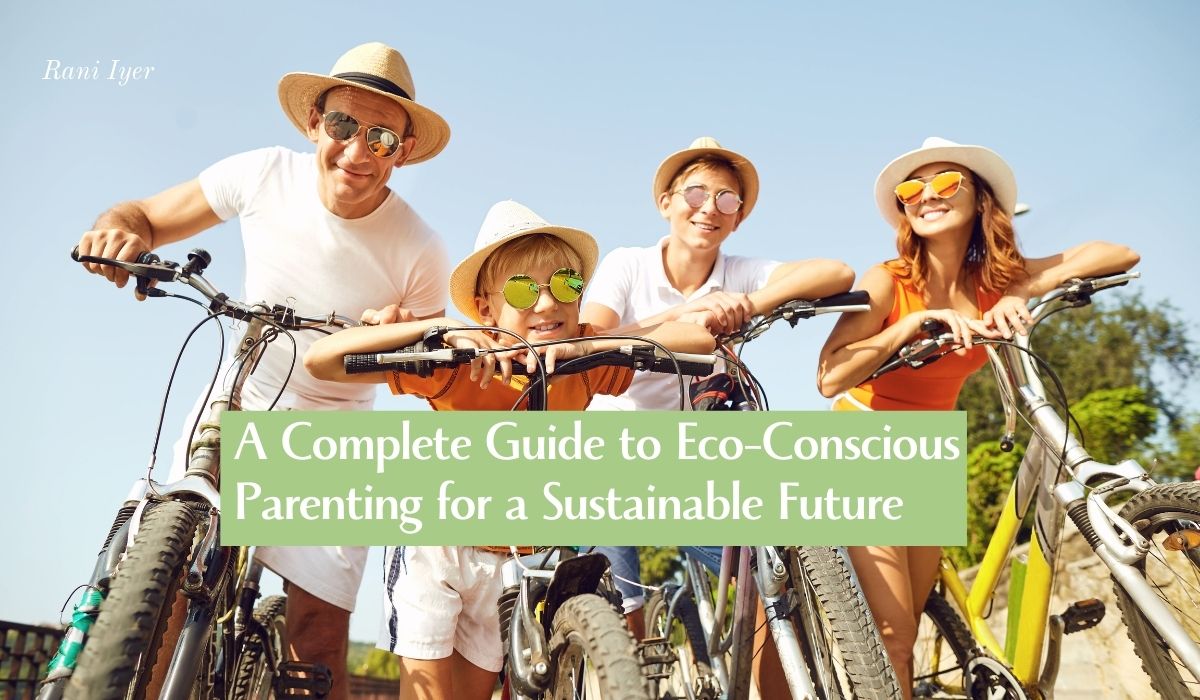We live in an era where environmental challenges loom large, the quest for eco-conscious parenting has never been more vital. “Raising Earth-Aware Kids: A Complete Guide to Eco-Conscious Parenting for a Sustainable Future” is your roadmap to nurturing a generation that is not only aware of their planet’s needs but is also actively engaged in its preservation. This comprehensive guide delves into innovative strategies and practical tips for integrating sustainability into daily life, empowering your children to become responsible stewards of the Earth. From teaching the value of recycling to embracing minimalism, every small step counts. Discover how to foster a deep appreciation for nature, instill eco-friendly habits, and inspire your little ones to think critically about their environmental footprint. Join us on this transformative journey towards raising mindful, Earth-aware kids who can build a brighter, greener future for all.
Understanding Eco-Conscious Parenting
Eco-conscious parenting is a modern approach to raising children with an acute awareness of environmental issues and a commitment to sustainable living. This method focuses on teaching kids the importance of preserving natural resources, reducing waste, and making eco-friendly choices in their daily lives. Unlike traditional parenting, which may not prioritize environmental education, eco-conscious parenting integrates these values into the foundation of a child’s upbringing, ensuring they grow up with a strong sense of responsibility towards the planet.
Parents who adopt eco-conscious practices often start by modeling sustainable behaviors themselves. Children learn by observing the actions of their caregivers, so when parents recycle, conserve water, and opt for reusable products, they set a powerful example. This approach goes beyond mere instruction; it creates a living environment where sustainability is the norm, not the exception. By embedding these values into everyday routines, parents can effectively instill a lifelong respect for the environment in their children.
Moreover, eco-conscious parenting is about more than just environmental stewardship; it encompasses a holistic view of health and well-being. This includes promoting a diet rich in organic and locally-sourced foods, encouraging outdoor activities that foster a connection with nature, and reducing exposure to harmful chemicals found in many household products. By adopting these practices, parents not only contribute to the health of the planet but also enhance the physical and mental well-being of their children.
The Importance of Raising Earth-Aware Kids
In today’s world, the importance of raising earth-aware kids cannot be overstated. With environmental crises such as climate change, deforestation, and pollution threatening our planet, the next generation must be equipped with the knowledge and tools to address these challenges. By instilling eco-conscious values from a young age, parents can help ensure that their children grow up to be proactive, informed, and engaged citizens who will advocate for a sustainable future.
One of the key reasons for raising earth-aware kids is the urgent need to mitigate the effects of climate change. As global temperatures rise and natural disasters become more frequent, it is crucial for future generations to understand the causes and consequences of these phenomena. Teaching children about renewable energy sources, the importance of reducing carbon footprints, and the benefits of sustainable living can empower them to make choices that positively impact the environment.
Additionally, fostering an appreciation for nature and wildlife is essential for developing a sense of stewardship in children. When kids spend time outdoors, exploring forests, rivers, and parks, they develop a deeper connection to the natural world. This connection often translates into a desire to protect and preserve these spaces for future generations. By encouraging outdoor activities and hands-on learning experiences, parents can nurture a love for nature that will inspire environmentally responsible behavior throughout their children’s lives.
Key Principles of Eco-Conscious Parenting
Eco-conscious parenting is built on several key principles that guide parents in raising environmentally aware children. One of the foundational principles is the concept of reduce, reuse, and recycle. Teaching kids to minimize waste by reducing consumption, reusing items whenever possible, and recycling materials helps them understand the importance of resource conservation. This principle can be applied to various aspects of daily life, from reducing plastic use to repurposing old clothing and toys.
Another important principle is the promotion of mindful consumption. Eco-conscious parents encourage their children to think critically about the products they use and the impact these products have on the environment. This includes choosing eco-friendly, non-toxic items, supporting sustainable brands, and avoiding single-use plastics. By making informed choices, children learn to prioritize sustainability over convenience, fostering a more environmentally responsible mindset.
Lastly, fostering a sense of community and collective responsibility is essential in eco-conscious parenting. Children should be taught that their actions, no matter how small, contribute to the larger goal of environmental preservation. Participating in community clean-up events, volunteering for conservation projects, and supporting local environmental initiatives are all ways to instill a sense of collective stewardship. By working together with others, children learn the value of collaboration and the power of collective action in creating positive change.
Incorporating Sustainability into Daily Routines
Incorporating sustainability into daily routines is a practical and effective way to teach children about eco-conscious living. One of the simplest ways to start is by making sustainable choices in the household. For example, parents can switch to energy-efficient appliances, use LED lighting, and implement water-saving measures such as low-flow showerheads and faucets. These small changes not only reduce the household’s environmental impact but also serve as daily reminders of the importance of conservation.
Meal planning and grocery shopping are also excellent opportunities to integrate sustainability into family life. Parents can involve their children in selecting locally-sourced, organic produce, and teach them about the benefits of eating seasonally. By reducing reliance on processed foods and minimizing food waste, families can promote healthier eating habits while also being kind to the planet. Additionally, starting a home garden can be a fun and educational way for kids to learn about growing their own food and the importance of sustainable agriculture.
Another key aspect of sustainable living is reducing waste through mindful consumption and recycling. Families can set up a recycling station at home, where kids can sort paper, plastic, glass, and metal. This hands-on activity helps children understand the recycling process and the importance of diverting waste from landfills. Parents can also encourage the use of reusable items, such as cloth bags, stainless steel water bottles, and cloth napkins, to further minimize waste and promote a culture of sustainability within the household.
Educational Resources for Eco-Friendly Living
Access to educational resources is crucial for parents seeking to raise eco-conscious children. Books, documentaries, and online platforms offer a wealth of information on environmental issues and sustainable practices. Parents can curate a collection of age-appropriate books that explore topics such as climate change, wildlife conservation, and renewable energy. These resources can spark curiosity and provide valuable insights into the challenges facing our planet and potential solutions.
In addition to books, documentaries and educational videos can be powerful tools for teaching children about the environment. Films like “Planet Earth,” “The Lorax,” and “Wall-E” not only entertain but also convey important messages about the beauty of nature and the consequences of environmental neglect. Watching these films together as a family can prompt meaningful discussions and inspire children to take action in their own lives.
Online resources, including websites, apps, and virtual workshops, offer interactive and engaging ways for children to learn about sustainability. Platforms like National Geographic Kids, Eco-Schools, and the World Wildlife Fund provide educational activities, games, and projects that encourage hands-on learning. By leveraging these digital tools, parents can create a dynamic and enriching educational environment that supports their children’s eco-conscious development.
Fun Activities to Foster Environmental Awareness
Engaging children in fun, hands-on activities is an effective way to foster environmental awareness. Outdoor adventures, such as hiking, camping, and birdwatching, provide opportunities for kids to experience nature firsthand and develop a connection to the environment. These activities not only promote physical health but also instill a sense of wonder and appreciation for the natural world. Parents can use these outings to teach children about local ecosystems, plant and animal species, and the importance of conservation.
Creative projects, such as arts and crafts using recycled materials, can also be a fun way to teach kids about sustainability. Parents can organize craft sessions where children make art from items like cardboard, bottle caps, and old magazines. These projects encourage kids to think creatively about repurposing materials and reducing waste. Additionally, gardening is a rewarding activity that teaches children about plant life cycles, the importance of pollinators, and the benefits of growing their own food.
Community involvement is another excellent way to foster environmental awareness. Participating in local clean-up events, tree planting initiatives, and conservation projects allows children to see the impact of their efforts on a larger scale. These experiences teach kids about the power of collective action and the importance of contributing to their community. By making environmental stewardship a shared family activity, parents can reinforce the values of responsibility and teamwork.
Choosing Eco-Friendly Products for Children
Selecting eco-friendly products for children is an important aspect of eco-conscious parenting. From clothing to toys to personal care items, the choices parents make can significantly impact the environment and their children’s health. Opting for products made from sustainable materials, such as organic cotton, bamboo, and recycled plastics, reduces the demand for harmful manufacturing practices and minimizes waste.
When it comes to clothing, parents can choose brands that prioritize ethical production and use environmentally-friendly materials. Organic cotton, for example, is grown without the use of synthetic pesticides and fertilizers, making it a safer option for both the environment and children’s sensitive skin. Additionally, purchasing second-hand clothing or participating in clothing swaps can further reduce the environmental footprint associated with fashion consumption.
Toys and personal care products are other areas where parents can make eco-friendly choices. Wooden toys, for example, are a durable and sustainable alternative to plastic toys, which often end up in landfills. Parents can also look for non-toxic personal care products, such as shampoos, lotions, and sunscreens, that are free from harmful chemicals like parabens and phthalates. By choosing products that are safe for both their children and the environment, parents can create a healthier and more sustainable living environment.
Building an Eco-Conscious Family Community
Building an eco-conscious family community involves creating a supportive network of like-minded individuals who share a commitment to sustainability. This can include friends, neighbors, schools, and local organizations that prioritize environmental stewardship. By connecting with others who share similar values, families can exchange ideas, resources, and support, making it easier to maintain eco-friendly habits.
One way to build an eco-conscious community is by participating in or organizing local environmental events. This can include neighborhood clean-ups, tree planting days, and educational workshops on topics like composting and recycling. These events provide opportunities for families to come together, learn from each other, and take collective action to improve their local environment.
Schools and educational institutions also play a crucial role in fostering an eco-conscious community. Parents can advocate for environmental education programs, sustainable practices, and green initiatives within their children’s schools. By collaborating with teachers, administrators, and other parents, families can help create a school culture that prioritizes sustainability and equips students with the knowledge and skills to make environmentally responsible choices.
Overcoming Challenges in Eco-Conscious Parenting
While the benefits of eco-conscious parenting are numerous, it is not without its challenges. One common obstacle is the perception that sustainable living is more expensive and time-consuming. While some eco-friendly products may have a higher upfront cost, they often save money in the long run through reduced energy consumption, decreased waste, and increased durability. Additionally, many sustainable practices, such as reducing consumption and reusing items, can actually lead to significant cost savings.
Another challenge is the prevalence of convenience-driven consumer culture, which can make it difficult to consistently make eco-friendly choices. Parents may struggle to find the time and resources to research sustainable products, prepare home-cooked meals, and implement green practices. To overcome this, families can start with small, manageable changes and gradually incorporate more sustainable habits into their routines. Seeking support from community resources, online platforms, and like-minded individuals can also help make the transition to eco-conscious living more manageable.
Educating children about the importance of sustainability can also be challenging, especially when competing with the influences of media and peer pressure. Parents can address this by creating a home environment that consistently reinforces eco-conscious values. Open communication, hands-on learning experiences, and positive reinforcement can help children internalize these values and make environmentally responsible choices, even when faced with external pressures.
The Future of Our Planet Starts at Home
The journey towards raising earth-aware kids is both rewarding and essential for the future of our planet. By integrating eco-conscious principles into daily life, parents can instill a deep appreciation for nature and a strong sense of responsibility in their children. From reducing waste and choosing sustainable products to fostering a connection with the natural world and building a supportive community, every small action contributes to a larger movement towards a sustainable future.
The impact of eco-conscious parenting extends beyond individual families; it has the potential to inspire broader societal change. As children grow up with a strong foundation of environmental awareness, they are more likely to advocate for sustainable practices, support green initiatives, and influence others to do the same. In this way, the efforts of eco-conscious parents today can lead to a more sustainable and resilient world for future generations.
Ultimately, the future of our planet starts at home. By raising children who are mindful of their environmental footprint and committed to protecting the Earth, parents can help create a brighter, greener future for all. The journey may have its challenges, but the rewards of nurturing a generation of earth-aware kids are immeasurable. Together, we can build a sustainable future, one family at a time.


